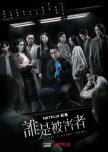
Deze recentie kan spoilers bevatten
I don't even know where to begin with this drama. Ever since I saw its teaser on Netflix, I was absolutely stoked, for multiple reasons. The production looked fantastic, it was shot in Taiwan , and the premise seemed extremely interesting and unique. My thoughts going into the show was the standard "genius detective that gives little regard to societal rules." As a friend pointed out, something along the line of characters such as Sherlock in "Sherlock BBC" or House in "House MD."I couldn't have been more wrong. The first thing that this show really nailed home was the depiction of Asperger's. The lead male actor, Henry Chang, did a fantastic job with his character Fang Yi-Ren. From the little awkward quirks, to his inability to properly interact with society, and his ineptness in dealing with human emotion, he really brought his character to life. The show did not romanticise the disorder or the supposed intellect that comes with it, but instead demonstrated the internal and external struggles of someone who has it. Chang's superb acting portrays these complexities and layers in his character in a way that never felt cringey or was "overacting" to me.
Fang Yi-Ren's direct foil was Xu Hai-Yin, played by Tiffany Hsu. While Chang's character was trying to understand emotions and be a "normal person", Hsu's character used empathy to her advantage to get whatever she needed to report about. She plays the ballsy reporter that will do what it takes to rise up in this world, even if it meant obtaining information illegally. Her background felt a bit forced to me in relation to the story's overarching theme, but received a satisfying closure in the end. While dialogue between the two characters were written to be awkward and stocky, their chemistry was surprisingly fun to watch and grew even better as the show neared its end. Chang and Hsu complemented each other well and I would be stoked to see them act together again (rumours of Season 2?) in the future.
Nearly all the side characters, their background, and their role were memorable to me. The story, as unusual as it would be to happen in real life, was something I hadn't seen before and it was clear to me that the writers spent a lot of time thinking and researching everything to the best they could. The last five to six minutes of each episode actually dives heavily into the behind-the-scenes and the film team shared much of what they did, such as interviewing mental health workers, reporters, policemen, or the extent they went to to try to get a "message" across. And as a viewer, I can say they definitely succeeded in this regard as I am still thinking about this show long after I finished it (in a day) and probably will for quite awhile.
At the same time, the really only "con" to this show is that the writers were trying to accomplish too much with too little episodes and more casual watchers might not find the experience as satisfying. The overlapping themes and subtle details were very thought-provoking, but not everyone prefers to ponder over such things or look for such aspects in a drama. There were also clearly parts where they were trying to tie up loose ends that felt slightly forced to me. If there were more episodes and they had the ability to shoot more scenes and "fill up" the story, I think the drama's emotional impact would have been a lot greater. More time to bond with the characters would have been nice as well. But for what they managed to accomplish in eight episodes is already quite impressive to me.
All in all, the show has amazing acting (seriously still impressed with the Asperger's portrayal), beautiful cinematography, intriguing detective cases, and a murder mystery that definitely kept me on my toes up to a satisfying ending. I think, what's also the MOST impressive to me, is that it is a Taiwanese drama that has all of these. For the longest time, I could not find a Taiwanese drama that I could sit down and finish without being disappointed or cringing at the acting or story. I say this as a Taiwanese citizen who is often letdown by the garbage one's country can produce. But I'm so happy to say that The Victim's Game proved me completely wrong and I would be absolutely ecstatic to see more Taiwanese dramas trend towards this direction in the future. Or, maybe Netflix funding is just something to behold.
Highly recommended drama and I will be rewatching in the future. I would love to continue to discuss it with anyone who would spare the time to watch it.
SPOILERS AHEAD:
Here are two central themes of the story that I wanted to talk a little more about in a way that I feel the drama didn't completely do and that would be better understood from a citizen's perspective.
The first victim, You Cheng-Hao (River Huang), chose death because she felt that she was trapped as transgender (male to female) in a society who shunned her. Her parents disowned her, she was forced to live a hard life in a host club, and even the customers mocked her as a "gay" when she was just trying to be herself. The reason behind her character couldn't have been more clear to me, as despite Taiwan being the first Asian country to legalise same-sex marriage, a lot of discrimination and legal issues still exist.
The perpetrator, Li Ya-Jun, was not only a depiction of mental health issues, but also on the struggles and likewise discrimination of illegal and foreign workers, which is quite prevalent in Taiwan. They are "nobodies," as one of the characters say, and being treated as essentially human trash in Taiwanese society led Ya-Jun into finding some kind of worth in her supposedly meaningless life.
Each of the "victims" had their own story and background that I assume the writers wanted the viewers to be able to empathise with. I certainly did with cancer patient...that one hit home.
To end with before I go on for too much longer: In one of the ending interviews, the screenwriters mentioned that you could see a part of each of the victims in the main lead, Fang Yi-Ren. That's still something that I'm thinking about and there is still so much to unpack in this amazing show. I hope that everyone who watches it will enjoy it as much as I did!
Vond je deze recentie nuttig?





